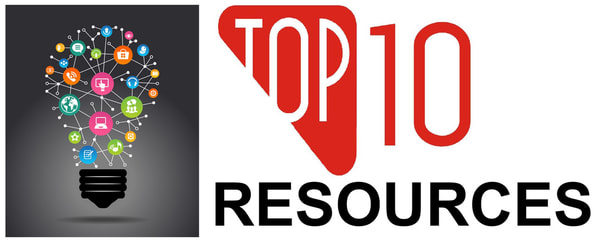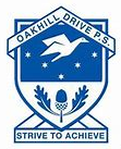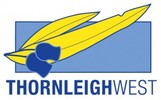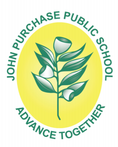Oakhill Drive completed their first round of Instructional Rounds in 2015 with their question being:
'Are our students using the Mathematics Proficiencies of communicating, reasoning and problem solving ?'
These resources are some of the fabulous tools we took away with us during this experience.
'Are our students using the Mathematics Proficiencies of communicating, reasoning and problem solving ?'
These resources are some of the fabulous tools we took away with us during this experience.
#1 Educreations and Showme Apps
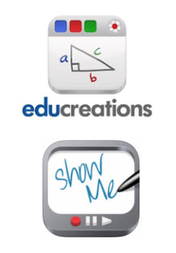
Educreations and Showme Apps
'These iPad apps are fantastic when getting the kids to communicate their thinking. This can be done simply with students taking photos of their work and adding explanations or evaluations, OR on a larger scale where students can record the screen as they draw their way through a mathematical problem at the same time using the voice recorder to annotate their strategies /reasons / processes. It is a great way to see what students are thinking as they solve problems! Showme is easier for the younger years as there is no login required.'
'These iPad apps are fantastic when getting the kids to communicate their thinking. This can be done simply with students taking photos of their work and adding explanations or evaluations, OR on a larger scale where students can record the screen as they draw their way through a mathematical problem at the same time using the voice recorder to annotate their strategies /reasons / processes. It is a great way to see what students are thinking as they solve problems! Showme is easier for the younger years as there is no login required.'
#2 Mini whiteboards
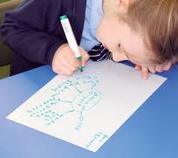
'Whiteboards are a fantastic alternative to paper when students are writing / drawing / using number lines to work out their answers. The beauty is that students are more likely to take risks as they feel it is more acceptable to rub out and change their work on a whiteboard then in their books. I also find that many students like to 'play teacher' and use the white board to demonstrate their working to a classmate.' Learn More @ Embedding Formative Assessment, pp. 77-83
#3 Enquiry Based Questioning
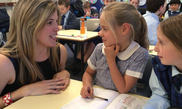
'It was amazing to see the difference in my students thinking as I changed my methods of questioning and allowed the students to communicate their problem solving skills. My students realise that there are many paths to finding a solution and learn a lot from sharing their methods and comparing the efficiency of different strategies.' (see Library Resource List - resources 4 and 5)
#4 concrete materials and games
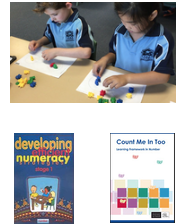
'I find the best way for students to communicate with each other, problem solve and give reasons is when they are involved in something hands on- concrete materials, especially a game! I find a lot of games in the DENS books. They learn so much from hearing and seeing their fellow classmates strategies and reasoning.' (see Library Resource List - resource 8)
#5 rich problem solving tasks
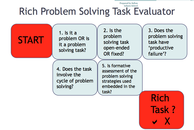
'I found this presentation so helpful when learning to evaluate my problem solving lessons and create rich tasks.' (see Library Resource List - resource 2)
#6 rich mathematics websites
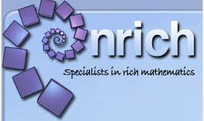
nrich.maths.org/teacher-primary (link)
'I love this site not only for it's rich tasks, but also because it keeps up to date with current events e.g. Looking at the different turns involved in Olympic sports as a way of exploring the mathematics of turns and angles.'
https://www.youcubed.org/resource/newsletters/ is another great website that we have recently found to enrich maths lessons.
#7 texts for Open ended and rich tasks
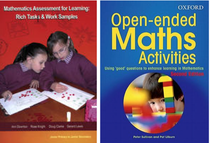
Mathematics Assessment for Learning: Rich Tasks and Work Samples'; Australian Catholic University AND
'Open-ended Maths Activities'; by Peter Sullivan and PatLilburn
'I find a lot of rich tasks in these books which work really well when I want to see my students communicating and problem solving.'
'Open-ended Maths Activities'; by Peter Sullivan and PatLilburn
'I find a lot of rich tasks in these books which work really well when I want to see my students communicating and problem solving.'
#8 think tanks
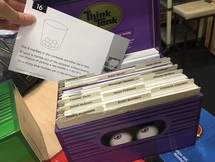
'There are two types per grade. One is algorithm based word problems and the other is problems that involve the various working mathematically strategies eg making tables, trial ad error, finding patterns etc. I find that these cards encourage students to discuss the language used in problems and the different approaches used to solve them.'
#9 authentic, relevant tasks
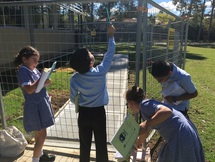
'Finding what the students are interested in, current events of interest, looking at what is happening around you eg new classroom construction. By making tasks authentic and relevant I find that the students become more engaged and have a stronger understanding of 'why' they are learning this new skill and how they can use it in the future.'
#10 using the correct vocabulary - found in the curriculum
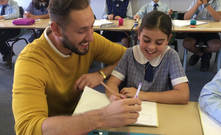
'Never be afraid to use and teach the students the correct terminology- even in the early Kindergarten years. Allow them to understand 'What is investigating, communicating, reasoning?' While still allowing the students to use their own language when explaining their reasons, also encourage them to try to use the metalanguage.'
